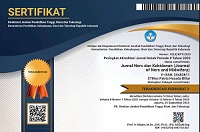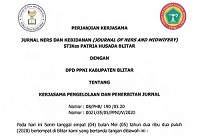Factors that Affect Coping Mechanisms in Chemotherapy Patients with the Approach of Callista Roy Adaptation Theory
DOI:
https://doi.org/10.26699/jnk.v6i2.ART.p235-240Keywords:
Adaptation Theory, Cancer, Chemotherapy, Coping MechanismsAbstract
Chemotherapy could cause pain in the patient, thus causing the condition of the body would gradually weaken. This condition would make the patient delay the therapy due to physical symptoms and emotional pressure (psychological), which affected the seriousness of patients in the treatment and strong coping mechanism required to maintain good conditions One of the empirical evidence of conceptual model theory "Holistic Adaptif System", Callista Roy put it, this model was used in chronic illnesses undergoing treatment, because theoretically successful handling by conducting adaptive coping mechanism behavior was an important variable in the physiological and psychological adaptation process to the stimulus that occurs. This study aimed to identify the behavior of patients using Callista Roy adaptology. This study aimed to analyze factors that influenced coping mechanisms in chemotherapy patients with the Callista Roy adaptation theory approach. This research design is analytical with a cross sectional approach. The population in this study were 95 patients. This research sampling technique was Consecutive Sampling. The sample size in this study was 78 respondents who met the criteria of the researcher. The research instrument used CAPS with an adaptation theory approach. The results showed that educational factors (p = 0.031) and job (p = 0.023) influenced the coping mechanism with the theory approach of Callista Roy adaptation to chemotherapy patients. The higher the level of education, the tolerance and control of stressors is better so that coping mechanisms become adaptive. Those who worked were more stress because they had to combine their work with scheduled care.References
American Cancer Society. (2016). Cancer Treatment & Survivorship Facts & Figures 2016-2017. American Cancer Society, 44. https://doi.org/10.3322/caac.21235
Aslam, M. S., Naveed, S., Ahmed, A., Abbas, Z., Gull, I., & Athar, M. A. (2014). Side Effects of Chemotherapy in Cancer Patients and Evaluation of Patients Opinion about Starvation Based Differential Chemotherapy. Journal of Cancer Therapy, 5(July), 817–822. https://doi.org/10.4236/jct.2014.58089
Astuti, I. W. (2014). Penerapan Teori Adaptasi Roy dan Symptom Management Humphreys Pada Asuhan Keperawatan Pasien Kanker Ovarium Post Operasi Sitoreduktif Dengan Kemoterapi. Jurnal Keperawatan Maternitas, 2(1), 35–43. Retrieved from https://simdos.unud.ac.id/uploads/file_penelitian_1_dir/1592c172b76ac272df4a284216569c31.pdf
Badan Penelitian dan Pengembangan Kesehatan. (2016). Riset PTM Tahun 2016. Retrieved from http://labdata.litbang.depkes.go.id/riset-badan-litbangkes/menu-riskesnas/menu-rikus/424-rptm-2016
CancerHelps. (2014). Bebas Kanker Itu Mudah. (Y. Indah, Ed.). Jakarta.
Dinas Kesehatan Kabupaten Mojokerto, 2016. (2016). Profil Kesehatan Kabupaten Mojokerto 2016.
Firmana, D. (2017). Keperawatan Kemoterapi. Jakarta Selatan: Salemba Medika.
Kasron, Sahran, & Ohorella, U. B. (2016). Teori Keperawatan dan Tokohnya. Jakarta Timur: CV. Trans Info Media.
Lutfa, U., & Maliya, A. (2008). Faktor-Faktor Yang Mempengaruhi Kecemasan Pasien Dalam Tindakan Kemoterapi Di Rumah Sakit Dr.Moewardi Surakarta. Berita Ilmu Keperawatan, 1(4), 187–192. Retrieved from http://journals.ums.ac.id/index.php/BIK/article/view/3733/2403
Maulina, R., & Bahri, T. S. (2016). The Coping Mechanism of Cancer Patients Undergoing Chemotherapy In Dr . Zainoel Abidin General Hospital of Banda Aceh. Jurnal Endurance, 2(3), 1–6.
Notoatmodjo, S. (2003). Pendidikan dan Perilaku Kesehatan. Jakarta: Rineka Cipta.
Nursalam. (2016). Metodologi Penelitian Ilmu Keperawatan (4th ed.). Jakarta: Salemba Medika.
Ohene-Oti, N. O., Addy, E. A., Agyemang, C., & Vanderpuye, V. (2016). Assessment of Emotional Distress in Cancer Patients Receiving Chemotherapy: A Case Study at the National Centre for Radiotherapy and Nuclear Medicine, Korle-Bu. Journal of Health, Medicine and Nursing, 26. Retrieved from https://pdfs.semanticscholar.org/c399/e92e006428bc0c09920eb2a592406ff2db5f.pdf
Roy, S. C. (2016). Coping and Adaptation Processing Scale (CAPS):Short Form(15-Item) nformation for Users. Chestnut Hil. Retrieved from https://www.bc.edu/content/dam/files/schools/son_sites/theorist/pdf/CAPS-Short Form User Manual 3-3-16.pdf
Smart, A. (2013). Kanker Organ Reproduksi. Jogjakarta: Aplus Books.
Sonia, Arifin, & Murni, 2014. (2014). Hubungan mekanisme koping dengan kepatuhan kemoterapi pada penderita keganasan yang mengalami ansietas dan depresi, 37(April 2014), 2–7.
Tanumidjojo, Y., S., L. B., & Yudiarso, A. (2004). Stres dan Perilaku Koping Pada Remaja Penyandang Diabetes Mellitus Tipe I. Anima, Indonesian Psychological Journal, 19(4), 399–406.
WHO. (2017). World Health Statistics 2017: Monitoring Health for The Sustainable Development Goals. World Health Organization. https://doi.org/10.1017/CBO9781107415324.004






